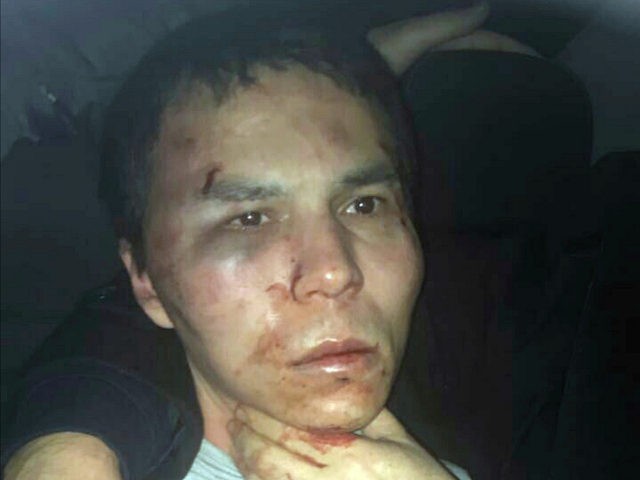The Islamic State terrorist responsible for a New Year’s Eve attack on a popular Istanbul nightclub told prosecutors he would like Turkey to execute him as he was disappointed by his own failed attempt at suicide following the massacre.
Abdulkadir Masharipov, the Uzbek national responsible for killing 39 people in the city’s Reina nightclub the night of December 31, reportedly told law enforcement officials during questioning that “it would be better” for him if he was executed, rather than being held “hostage” by police. “I would kill myself so that I wouldn’t fall into the hands [of police]. It was a suicide [attack],” Masharipov told law enforcement, according to the Turkish government-friendly Sabah newspaper. Police said he requested they “hang him if they can.”
As Turkey does not currently permit the death penalty, a court cannot legally honor Masharipov’s request.
Sabah also reported on the details of Masharipov’s background before becoming a full-time Islamic State terrorist, according to sources within law enforcement. The jihadist began his career as a teacher before joining the Islamic State and claimed he had planned to attack Istanbul’s Taksim Square but found too much security there on New Year’s Eve. Instead, his contact in the Islamic State suggested the Reina nightclub.
“There were police officers everywhere,” Masharipov reportedly told law enforcement. “I changed my mind. I called Abu Cihad and told him that I can’t carry out the attack there. Then I went to scope out Reina. Abu Cihad sent me the address and photos of Reina. I constantly texted him. I didn’t see him face-to-face. I went in front of Reina and there were no police officers or security.”
Following the attack, Masharipov reportedly said he attempted to use a grenade to kill himself but failed.
He also told investigators, Hurriyet reported, the reason why he engaged in the attack: “I wanted to stage the attack on Christians in order to exact revenge on them for their acts committed all over the world. My aim was to kill Christians.”
Masharipov killed 39 people, most young Middle Eastern tourists, at Reina nightclub on New Year’s Eve, shooting them in the darkness of the nightclub. Security footage showed the terrorist entering the nightclub wearing a Santa Claus hat. He remained at large for two weeks with his four-year-old son before authorities apprehended him, finding in his apartment three Islamic State recruits and $200,000.
The Islamic State appears to have targeted the nightclub because it chose to host a New Year’s party, tolerating a holiday the jihadists see as a decadent Western deviation from Islam. The group took responsibility for the attack, ending speculation from pro-government media that foreign governments, particularly the United States, were behind the attack. Government officials nonetheless speculated that the Islamic State may have received aid from “an intelligence organization” in organizing the attack.
The massacre was the latest in a string of terrorist attacks by Islamic State jihadists and Kurdistan Workers’ Party (PKK) terror group affiliates that have significantly damaged the Turkish tourism industry. By the end of 2016, before the Reina massacre, Turkey experienced a 21-percent drop in the number of foreign tourists entering the country.
To combat the negative image of Turkey as a terror hotbed that the string of attacks has created, the Turkish government announced a series of new regulations this month that would limit coverage of terrorist attacks. TV news stations are now prohibited from using the phrase “breaking news” or making any “exaggerated statements involving agitation” as well as reporting the location of a terrorist attack or broadcasting any images of “fire department vehicles, police vehicles, ambulance footage, witness accounts, officials at the scene, and evidence-collecting work.”
Ankara has also conducted mass arrests of alleged terrorist suspects as a form of proving it is taking the terrorist threat seriously. In the past week, Turkish officials say they have arrested over 1,000 suspected members of terror organizations. Most, however, are not members of the Islamic State. Only 45 of those arrested this week have suspected ties to ISIS, while 520 have suspected ties to the PKK.
Police suspect that 792 of those arrested support Fethullah Gulen, an Islamic cleric who runs a chain of charter schools from his home in Pennsylvania. Turkish President Recep Tayyip Erdogan claims Gulen organized the failed coup against him in July 2016, though Gulen has repeatedly denied this and the Turkish government has not provided the United States any evidence supporting this claim.

COMMENTS
Please let us know if you're having issues with commenting.